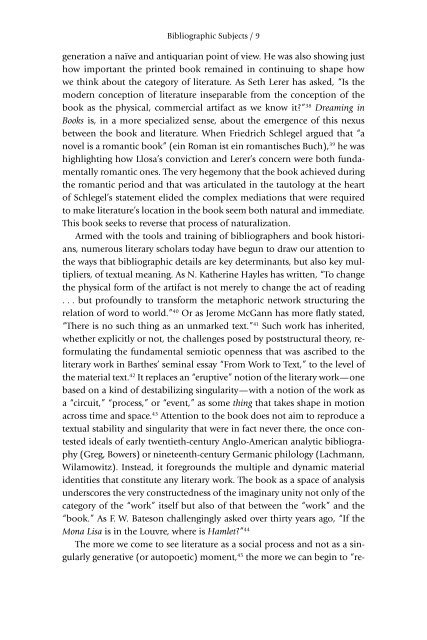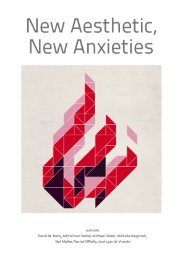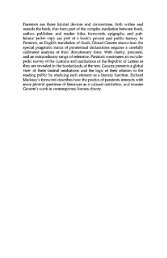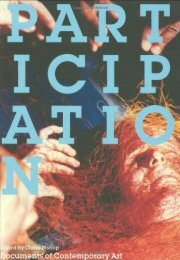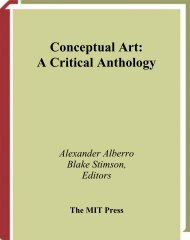Dreaming in Books - uncopy
Dreaming in Books - uncopy
Dreaming in Books - uncopy
Create successful ePaper yourself
Turn your PDF publications into a flip-book with our unique Google optimized e-Paper software.
Bibliographic Subjects / 9<br />
generation a naïve and antiquarian po<strong>in</strong>t of view. He was also show<strong>in</strong>g just<br />
how important the pr<strong>in</strong>ted book rema<strong>in</strong>ed <strong>in</strong> cont<strong>in</strong>u<strong>in</strong>g to shape how<br />
we th<strong>in</strong>k about the category of literature. As Seth Lerer has asked, “Is the<br />
modern conception of literature <strong>in</strong>separable from the conception of the<br />
book as the physical, commercial artifact as we know it?” 38 <strong>Dream<strong>in</strong>g</strong> <strong>in</strong><br />
<strong>Books</strong> is, <strong>in</strong> a more specialized sense, about the emergence of this nexus<br />
between the book and literature. When Friedrich Schlegel argued that “a<br />
novel is a romantic book” (e<strong>in</strong> Roman ist e<strong>in</strong> romantisches Buch), 39 he was<br />
highlight<strong>in</strong>g how Llosa’s conviction and Lerer’s concern were both fundamentally<br />
romantic ones. The very hegemony that the book achieved dur<strong>in</strong>g<br />
the romantic period and that was articulated <strong>in</strong> the tautology at the heart<br />
of Schlegel’s statement elided the complex mediations that were required<br />
to make literature’s location <strong>in</strong> the book seem both natural and immediate.<br />
This book seeks to reverse that process of naturalization.<br />
Armed with the tools and tra<strong>in</strong><strong>in</strong>g of bibliographers and book historians,<br />
numerous literary scholars today have begun to draw our attention to<br />
the ways that bibliographic details are key determ<strong>in</strong>ants, but also key multipliers,<br />
of textual mean<strong>in</strong>g. As N. Kather<strong>in</strong>e Hayles has written, “To change<br />
the physical form of the artifact is not merely to change the act of read<strong>in</strong>g<br />
. . . but profoundly to transform the metaphoric network structur<strong>in</strong>g the<br />
relation of word to world.” 40 Or as Jerome McGann has more fl atly stated,<br />
“There is no such th<strong>in</strong>g as an unmarked text.” 41 Such work has <strong>in</strong>herited,<br />
whether explicitly or not, the challenges posed by poststructural theory, reformulat<strong>in</strong>g<br />
the fundamental semiotic openness that was ascribed to the<br />
literary work <strong>in</strong> Barthes’ sem<strong>in</strong>al essay “From Work to Text,” to the level of<br />
the material text. 42 It replaces an “eruptive” notion of the literary work—one<br />
based on a k<strong>in</strong>d of destabiliz<strong>in</strong>g s<strong>in</strong>gularity—with a notion of the work as<br />
a “circuit,” “process,” or “event,” as some th<strong>in</strong>g that takes shape <strong>in</strong> motion<br />
across time and space. 43 Attention to the book does not aim to reproduce a<br />
textual stability and s<strong>in</strong>gularity that were <strong>in</strong> fact never there, the once contested<br />
ideals of early twentieth- century Anglo- American analytic bibliography<br />
(Greg, Bowers) or n<strong>in</strong>eteenth- century Germanic philology (Lachmann,<br />
Wilamowitz). Instead, it foregrounds the multiple and dynamic material<br />
identities that constitute any literary work. The book as a space of analysis<br />
underscores the very constructedness of the imag<strong>in</strong>ary unity not only of the<br />
category of the “work” itself but also of that between the “work” and the<br />
“book.” As F. W. Bateson challeng<strong>in</strong>gly asked over thirty years ago, “If the<br />
Mona Lisa is <strong>in</strong> the Louvre, where is Hamlet?” 44<br />
The more we come to see literature as a social process and not as a s<strong>in</strong>gularly<br />
generative (or autopoetic) moment, 45 the more we can beg<strong>in</strong> to “re-


